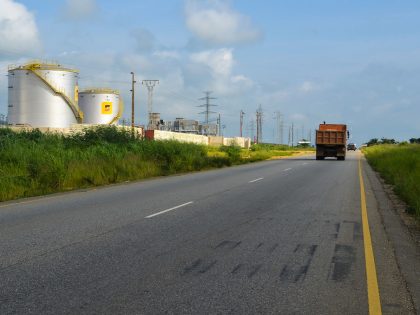The global and class inequalities of fossil fuel subsidy reform
Climate activists and leftists should tread cautiously when they use the climate argument to support fossil fuel subsidy reform in Africa.

Image credit Sosialistisk Ungdom (SU) via Flickr CC.
Since the G20 meeting in 2009, a range of international organizations have used climate change arguments to press for fossil fuel subsidy reform. A widely read International Monetary Fund (IMF)-study from the same year estimates that the global cost of fossil subsidies in 2017 was about $5.2 trillion, and that cutting these would reduce global carbon emissions by 28%. These amounts include direct subsidies to production and consumption, as well as external costs such as health and environment.
Now, the World Bank, Organization for Economic Co-operation and Development (OECD), and the International Energy Agency (IEA) want to use COVID-19 as an opportunity to get rid of what it considers inefficient fossil fuel subsidies. The G20 did not achieve much before 2020, only reducing fossil fuel subsidies by 9%. Most of this reduction resulted not from active policies, but from lower costs of the subsidies, due to reduced international petroleum prices.
However, in responding to COVID-19, the G20 is moving in the wrong direction with new subsidies in the form of equity injections, loans, tax exemptions, and the relaxing of environmental standards. G20 countries spent about $170 billion in “public money commitments to fossil fuel-intensive sectors between January 1 and August 12, 2020.” In the US, COVID-19 packages to fossil fuel companies cost the public at least $50 million, in addition to the $20 billion annual subsidies. In Norway, a member of the non-G20 country group “Friends of Fossil Fuel Subsidy Reform,” the oil industry got tax postponements worth more than $10 billion.
Through bilateral relations and international institutions, the same governments—mainly in the global North—continue to push for consumer fuel subsidy reforms in the global South. In response, fuel riots against price increases have taken place in 41 countries between 2005 and 2018, including Trinidad and Tobago, Nigeria, Egypt, Nepal, Sudan, Ghana, Cameroon, and Zimbabwe. As the IMF and allied institutions insist that fuel subsidies primarily benefit the middle classes, protests appear not only an obstacle to climate mitigation, but paradoxical and contrary to their own interests.
In Nigeria, there has been regular and successful popular resistance against the removal of subsidies since the mid-1980s, most famously in 1993, when then president General Ibrahim Babangida annulled election results, and almost two decades later, with the Occupy Nigeria 2012 protests. With the combined oil and COVID-19-crisis, pump prices rose again in 2020. In September, the Nigerian Labor Congress (NLC) suspended their announced subsidy strike, marking a historical turn in labor action, both in accepting deregulation and by disengaging with social unionism. Other civil society actors reacted with disappointment and anger, and many protesters included the demand for lower fuel prices in the #EndSARS protests, framed mainly against police violence. Now, the pump price has increased again, the NLC is threatening strike action, and the government may reintroduce the subsidy.
In Sudan, the first attempt to remove subsidies was in 1999 under the government of Omar al-Bashir. The Sudanese Workers’ Trade Union Federation (SWTUF), usually loyal to Bashir, opposed the attempt, but it was not until 2013 that the SWTUF threatened to strike over subsidy reform. Again in 2018 al-Bashir attempted to remove bread and fuel subsidies, which triggered the Sudan revolution. With the independent Sudan Professional Association in the driver’s seat, al-Bashir was forced to step down in April 2019. Today, the ruling alliance under the Forces of Freedom and Change is under pressure over subsidies. The Sudanese Communist Party (SCP) recently announced its withdrawal from the coalition, referring to the government’s plans to remove subsidies.
I talked to trade unionists from the NLC, SWTUF, Ghana Trade Union Congress and Zimbabwe Congress of Trade Unions to understand why labor opposes the removal of subsidies. While acknowledging climate change, the unionists from all four countries insisted, contrary to the neoliberalist narrative, that fuel subsidy removals are anti-poor and anti-worker. All referred to attempts to remove subsidies as linked to austerity policies, such as Structural Adjustment Programs, dating back to the 1980s.
Increased fuel prices have immediate and inflationary effects and thus impact poor people disproportionately. In 2012 in Nigeria, when President Goodluck Jonathan removed the subsidy overnight, the pump price increased by 141%, and costs of transport, food, and medicine went up immediately. Minimum wages lost their purchasing power. In Sudan and Ghana, unionists explain that loss of fuel subsidies also negatively impact agricultural production.
Africans are particularly vulnerable to climate change, while the continent’s contribution to global greenhouse gas emissions is minimal. In fact, according to the IEA, the COVID-19 crisis is reversing progress on energy access in Africa. For the poor, alternative energy sources, such as using wood instead of kerosene for cooking, can even be worse for public health and the environment. When international institutions argue that the savings from subsidy cuts would be better spent on more pro-poor targeted policies, unions respond that they do not trust the governments to do so. Before subsidy reform, they argue, basic social welfare policy and infrastructure should be in place. Furthermore, in their countries, reform is not aimed at mitigating climate change through budget reallocation, but for budget savings. Recently in Nigeria, the minister of petroleum said there was a choice between low fuel prices (and subsidies) and workers getting paid at all. A Ghanaian unionist presented a simpler solution to the fiscal constraints: Tax the rich.
Climate activists and leftists should tread cautiously when they use the climate argument to support the fossil fuel subsidy reform agenda in Africa. As Sean Sweeny has warned, neoliberal policies and approaches to energy transition “will produce outcomes that are considerably worse than the outcomes produced by fossil fuel subsidies.”





